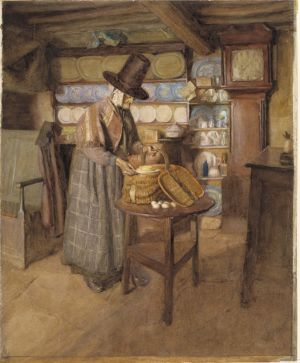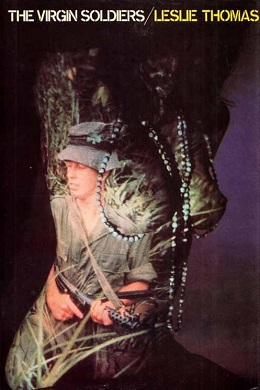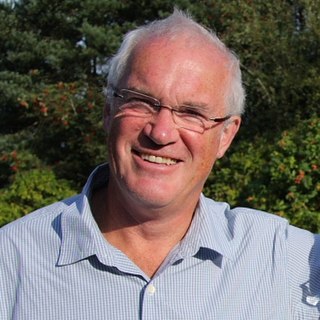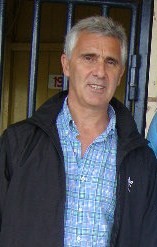
Leslie Thomas, OBE (22 March 1931 – 6 May 2014) was a Welsh author best known for his comic novel The Virgin Soldiers . [1]

Leslie Thomas, OBE (22 March 1931 – 6 May 2014) was a Welsh author best known for his comic novel The Virgin Soldiers . [1]
This section needs additional citations for verification .(March 2019) |
Thomas was born in Newport, Monmouthshire, Wales. He was orphaned at the age of 12, when his mariner father was lost at sea and his mother died only a few months later from cancer. [2] He was subsequently brought up in a Dr Barnardo's home; the story of this upbringing was the subject of his first, autobiographical, book, This Time Next Week.
Thomas attended Kingston Technical School and he then took a course in journalism at South-West Essex Technical College in Walthamstow. [3] In 1949 he was called up for National Service and embarked on a two-year tour of duty in Singapore with the Royal Army Pay Corps. While there he was briefly involved with the military action against communist rebels in the Malayan emergency. He also began to write short articles for publication in English newspapers.
This section relies largely or entirely on a single source .(March 2019) |
Upon his return to England in 1951, Thomas resumed his work for the local newspaper group in north London where he had worked before his National Service, but within five years he was working for the Exchange Telegraph news agency, now Extel, and eventually with the London Evening News newspaper, first as a sub-editor, later as a reporter. He stayed with the Evening News until 1965, when he embarked full-time on his writing career.[ citation needed ]
In 1984, Thomas published In My Wildest Dreams recounting his childhood in South Wales, his days in Doctor Barnardo's homes in London, his National Service in the Far East, and his career in journalism. His novels about 1950s British National Service such as The Virgin Soldiers spawned two film versions, in 1969 and 1977, while his Tropic of Ruislip and Dangerous Davies, The Last Detective have been adapted for television (the former as Tropic in 1979 and the latter having also spawned a film version, in 1981 and a TV series in 2003 with Peter Davison).
He was a subject of the television programme This Is Your Life in 1979 when he was surprised by Eamonn Andrews at a Barnardo’s hostel in Kingston, Surrey.[ citation needed ]
His experiences as a British Army conscript in the Far East during the height of the Malayan emergency were recalled when he appeared in the BBC Radio 2 documentary Caught in the Draft in 1985. He joined ex-RAF national serviceman Bob Monkhouse and BBC Radio 2 drivetime presenter John Dunn in a programme filled with reminiscences about their years in uniform. He was also featured in the short-lived BBC One show Time of My Life in 1983. The show was presented by Noel Edmonds and Thomas was reunited with National Service colleague Reg Wilcock for the first time in 32 years. They duetted on "Tumbling Tumbleweeds", a song they used to sing frequently at the Liberty Club in Singapore.
Thomas was the subject of the first edition of BBC Wales' series Great Welsh Writers, broadcast on BBC One Wales on 25 February 2013. [2] The programme featured interviews with Thomas, Peter Grosvenor, Frederick Forsyth and Tim Rice, as well as archive clips from earlier programmes. [4]
In the 2005 New Year Honours, he was made an Officer of the Order of the British Empire for services to literature. [5]
He died in Salisbury after a lengthy illness on 6 May 2014, aged 83. [1]
Biographical
Novels
Dangerous Davies novels
Travel
Miscellaneous
TV scripts

Owain ap Gruffydd, commonly known as Owain Glyndŵr was a Welsh leader, soldier and military commander in the late Middle Ages, who led a 15-year-long Welsh revolt with the aim of ending English rule in Wales. He was an educated lawyer, forming the first Welsh parliament under his rule, and was the last native-born Welshman to claim the title Prince of Wales.

Wales is a country that is part of the United Kingdom. It is bordered by the Irish Sea to the north and west, England to the east, the Bristol Channel to the south, and the Celtic Sea to the south-west. As of 2021, it had a population of 3.2 million. It has a total area of 21,218 square kilometres (8,192 sq mi) and over 2,700 kilometres (1,680 mi) of coastline. It is largely mountainous with its higher peaks in the north and central areas, including Snowdon, its highest summit. The country lies within the north temperate zone and has a changeable, maritime climate. Its capital and largest city is Cardiff.

Thomas George Thomas, 1st Viscount Tonypandy, was a British politician who served as a member of parliament (MP) and Speaker of the House of Commons from 1976 to 1983. He was elected as a Labour MP.

The culture of Wales is distinct, with its own language, customs, festivals, music, art, cuisine, mythology, history, and politics. Wales is primarily represented by the symbol of the red Welsh Dragon, but other national emblems include the leek and the daffodil.

Hywel Thomas Bennett was a Welsh film and television actor. He had a lead role in The Family Way (1966) and played the titular "thinking man's layabout" James Shelley in the television sitcom Shelley (1979–1992).

The Virgin Soldiers is a 1966 comic novel by Leslie Thomas, inspired by his own experiences of National Service in the British Army. It was Thomas' debut novel; he had previously published an autobiography. The Virgin Soldiers sold millions of copies during the author´s lifetime.

John Davies, FLSW was a Welsh historian, and a television and radio broadcaster. He attended university at Cardiff and Cambridge and taught Welsh at Aberystwyth. He wrote a number of books on Welsh history, including A History of Wales.
This article is about the particular significance of the year 1984 to Wales and its people.

Edward Thomas Butler was a Welsh rugby union player, journalist and sports commentator.

Wales in the late Middle Ages spanned the years 1282–1542, beginning with conquest and ending in union. Those years covered the period involving the closure of Welsh medieval royal houses during the late 13th century, and Wales' final ruler of the House of Aberffraw, the Welsh Prince Llywelyn II, also the era of the House of Plantagenet from England, specifically the male line descendants of Geoffrey Plantagenet, Count of Anjou as an ancestor of one of the Angevin kings of England who would go on to form the House of Tudor from England and Wales.

The media in Wales provide services in both English and Welsh, and play a role in modern Welsh culture. BBC Cymru Wales began broadcasting in 1923 have helped to promote a form of standardised spoken Welsh, and one historian has argued that the concept of Wales as a single national entity owes much to modern broadcasting. The national broadcasters are based in the capital, Cardiff.

William Gareth Davies is a former Wales and British and Irish Lions international rugby union player and former chairman of the Welsh Rugby Union.

Thomas Alun Rhys Davies is a Welsh Labour and Co-operative party politician serving as the Member of the Senedd (MS) for Blaenau Gwent since 2011, and formerly Mid and West Wales from 2007 to 2011. He has served in several Welsh government offices, including Cabinet Secretary for Local Government and Public Services, Minister for Lifelong Learning and Welsh Language, and Minister for Natural Resources and Food.

Television in Wales began in 1952. Initially, all programmes were in English with occasional Welsh language programmes. In 1982 Welsh language channel S4C was launched. The digital switchover happened in 2009-2010 and S4C became an exclusively Welsh language channel.

Radio broadcasting in Wales began in 1923 with the inauguration of the British Broadcasting Corporation's (BBC) station at Cardiff. Radio broadcasting has been a prime source of news and entertainment for the population of Wales since that date. As well as the public service provided by the BBC, Wales has private regional and national services producing programmes in both the Welsh and English languages; though the provision of Welsh language radio has been historically inconsistent and politically divisive.
This article is about the particular significance of the year 2014 to Wales and its people.
Huw Llywelyn Davies is a Welsh broadcaster and rugby union commentator.

Tropic of Ruislip is a 1974 novel by British author Leslie Thomas. It explores the British class divide and themes such as wife swapping. The title refers to Ruislip, one of London's outer suburbs, but the book is set in another suburb, Carpenders Park.

This is a timeline of Welsh history, comprising important legal and territorial changes, and political events in Wales.

Adrian Masters is a Welsh journalist, presenter, author and political moderator.